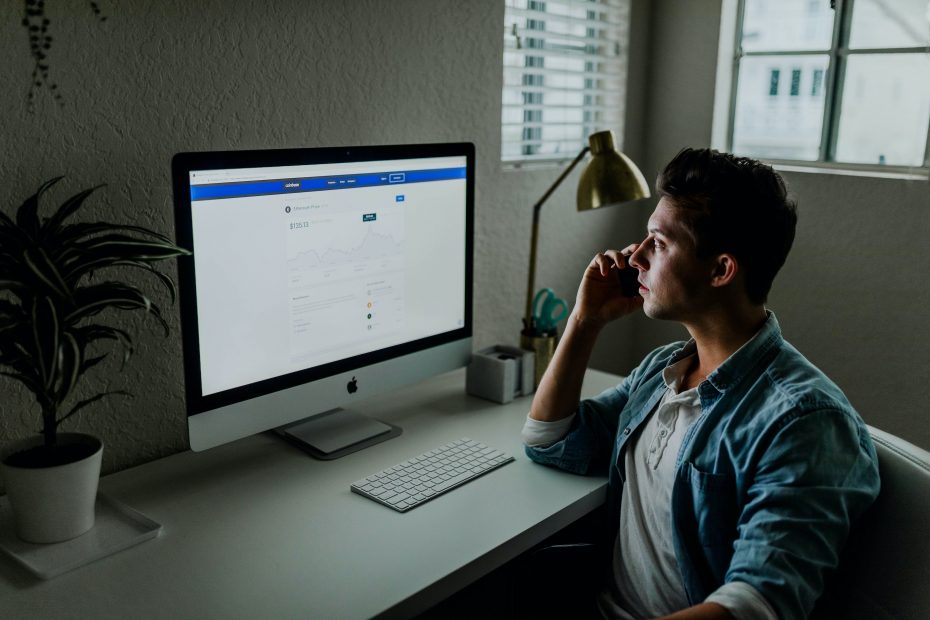Up to 60% of UK employees are working from home during the pandemic, a large proportion of whom plan to continue to do so. This brings many risks to our mental health, wellbeing and productivity. The boundaries between work and home life can become blurred, we may fall into unhelpful working habits and the lack of human contact can result in chronic loneliness. This blog explores these issues and suggests how we can avoid the the mental health risks of working from home.
Isolation, loneliness and mental health

2.6 million British people can be categorised as ‘chronically lonely’ during lockdown. Another 14.3% have experienced reduced wellbeing due to loneliness in the past seven days.
Many of us are missing the interactions that we took for granted in our pre-COVID workplaces. Water cooler chats, lunchtime laughs, hugs with colleagues and life-enhancing spontaneous connections are all great for wellbeing. We need human connection and many of us are feeling the negative effects of isolation when working from home.
The mental health risks of working from home are magnified if we are working alone and/or have previously experienced mental health issues such as depression.
How to combat the damaging effects of loneliness
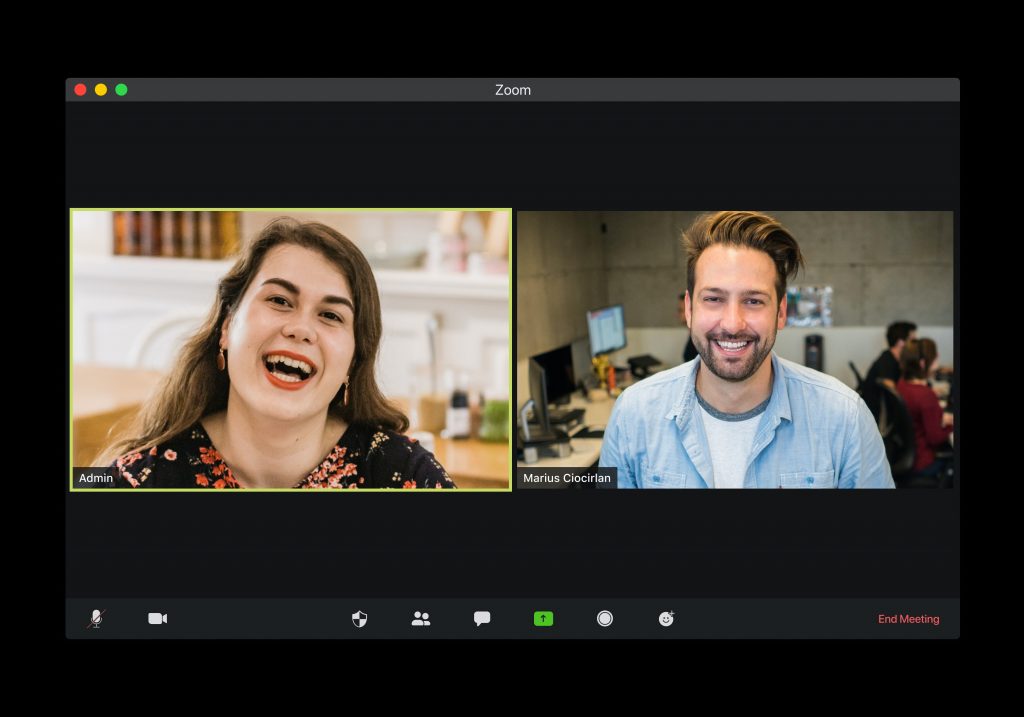
- Workplaces can be a great way to meet friends. Having a support network of work colleagues can be a really helpful way of protecting against the mental health risks of working from home.
- Plan-in regular chats with colleagues. This can be a good way to let off steam, problem solve, unwind and enjoy some laughter – even via online portals such as Zoom.
- Connect socially with others frequently: in person, virtually or by telephone.
- Allow time during work videoconferences for checking in, sharing personal updates that are not work-related.
- If you are a manager, try checking in with your staff at the beginning and end of each day. Focus on wellbeing and offer your support. Let your colleagues know that work deadlines are not the only thing that matters to you.

The dangers of ‘working lunches‘
1 in 3 UK workers work through their lunch every day and only 1 in 3 regularly take a proper lunch break. Working through lunch can:
- leave you feeling stressed, tired and less focussed
- reduce your motivation and creativity
- impact your mood.
Over time, failing to take regular rest breaks from work can have negative impacts on mental health. Increased stress can lead to burnout, anxiety disorders and mood disorders like depression.
Research suggests that a 20-minute walk in nature is one of the best ways to combat stress. Taking a lunchtime break like this allows your mind and body to rest, recharge and refocus. Taking regular rests from work can significantly boost your productivity and creativity for the rest of the day – especially when combined with exercise like walking.
Why do so many of us fail to take a proper lunch break?
In some workplaces, the culture is such that staff are seen as lazy if they take a lunch breaks, whilst those who stay at their desk working are seen as more dedicated. This can lead employees to feel ashamed if they do take breaks away from their work. Stressful deadlines plus pressure and bullying from managers frequently contribute to an unhealthy corporate atmosphere. Many employers focus on targets at the expense of wellbeing and see ‘working lunches’ as a positive thing.
How can we change this toxic mentality?
- Ask managers to lead from the front – openly taking and promoting regular breaks, thus encouraging employees to follow suit.
- Consider creating welcoming break rooms in the workplace.
- For remote workers, send automated reminders encouraging them to take regular breaks every day.
- Consider offering paid breaks within the terms and conditions of employment contracts.
- Post blogs promoting the benefits of healthy, mindful eating, exercise, and of connecting with friends and colleagues whilst taking a break at lunchtime.
The dangers of NOT commuting to work

UK employees who are working from home during the pandemic are saving an average of 84 minutes per day by not commuting to their workplace. However, these employees are working an extra 2 hours per day on average. So, despite ‘gaining’ some time every day, we are actually working more and resting less.
Although commuting may not be a joyful, relaxing activity for many of us, it can be a useful way to separate our home and working lives. Commuting offers us an opportunity to enjoy listening to music, podcasts or an audiobook. We are gifted a chance to relax and decompress after a long day at work…or just clear our minds and enjoy some mindful silence.
Losing the ‘bookending’ of our working day raises the risk that we are constantly ‘on the go’. Without periods of peaceful reflection and relaxation, we are not able to function as efficiently. Combining this with the great pressures that many of us face on a daily basis increases the risk of burnout and developing mental health issues.
If you are no longer commuting to work, why not try a ’no commute commute’?
- At the time you would normally begin your journey to work, go for a walk instead.
- Use the time to relax, connect with nature, organise your thoughts or listen to something inspiring, relaxing or amusing.
- Then, at the time you would normally end your working day, turn your computer off – and leave it off. Go for another walk or run. This can help segment your day whilst getting some exercise and fresh air, boosting your mental, emotional, physical and spiritual health.
Why do we push ourselves so hard? …and how to stop doing it.
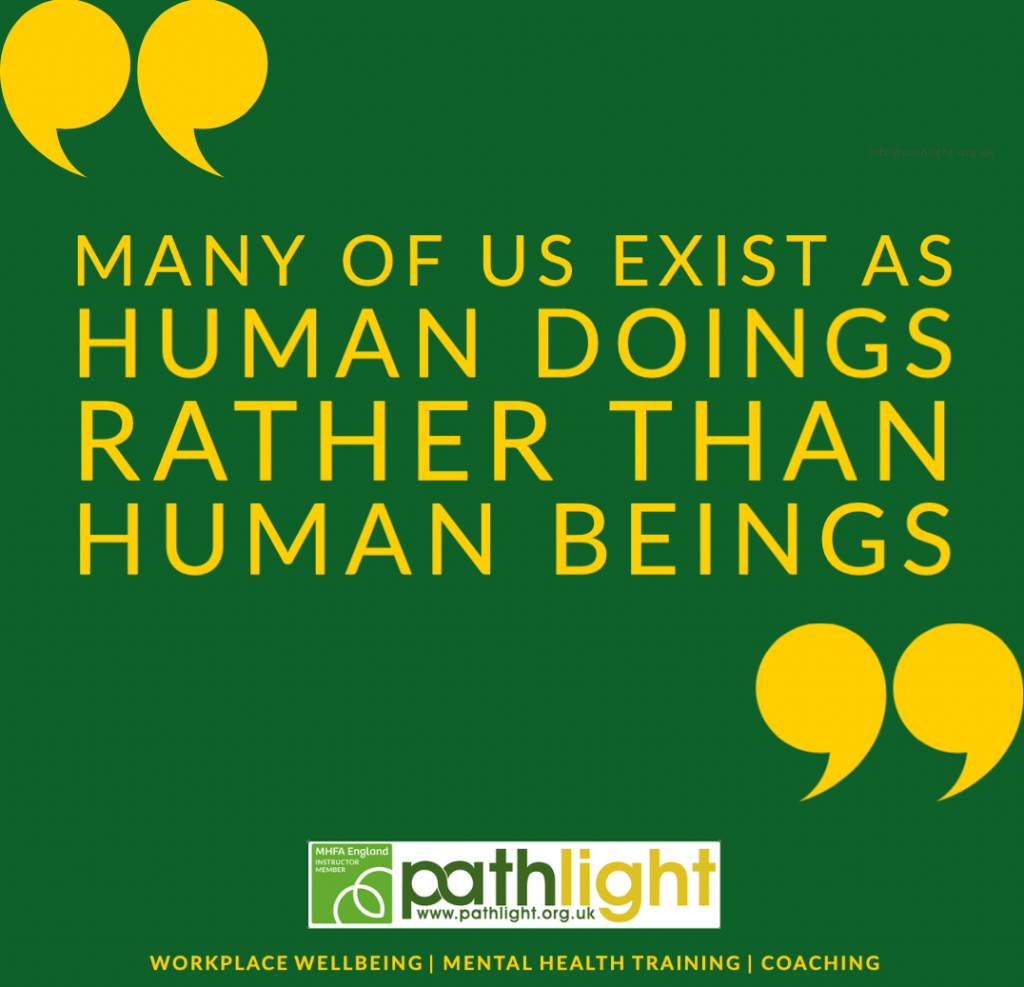
Many of us exist as ‘human doings’ rather than human beings. Our workplaces and wider culture generally champion working harder, faster and longer. ‘Success’ often equates to meeting increasingly demanding deadlines, often with little regard for individuals’ wellbeing.
Many employers may be unaware of the mental health risks of working from home. And, without colleagues around them to chat to and share drinks breaks with, those who are working from home may be putting their wellbeing under greater strain.
As a result of this highly-driven, goal-oriented culture, many of us feel guilty when we feel we are not doing something ‘productive’. Many of us fill every minute of every day, juggling our various responsibilities and fitting in as much ‘stuff’ as possible.
Many people see self-care as selfish. And many of us only take a break when our minds or bodies send us a message that forces us to slow down or stop.
Rather than waiting for our mental or physical health to reach crisis point, committing to a healthier work-life balance is key. Prevention is always better than cure. Establish and commit to your priorities; nurture and invest time in what is truly important to you.
‘I wish I hadn’t worked so hard’ is one of the top 5 regrets of the dying.

Try meditating upon the ‘deathbed scenario’:
- Imagine you are at the end of your life, looking back on how you spent your hours, days and years.
- What do you regret having spent so much time upon?
- What do you regret having not having spent more time upon?
- Adjust your life accordingly.
Be aware of the mental health risks of working from home. Create healthy boundaries around your working life and downtime. Taking time out to walk, bathe, meditate or just do nothing boosts our mental, emotional, physical and spiritual health.
Research shows that resting more and doing less can improve our mental health, wellness, productivity and creativity.
Other benefits include:
- A more engaged workforce.
- Increased productivity and performance.
- Reduced injuries in physically demanding roles.
- A boost in creativity.
- Reduced presenteeism and absenteeism.
- Improved job satisfaction.
The huge financial and wellbeing costs of insufficient rest
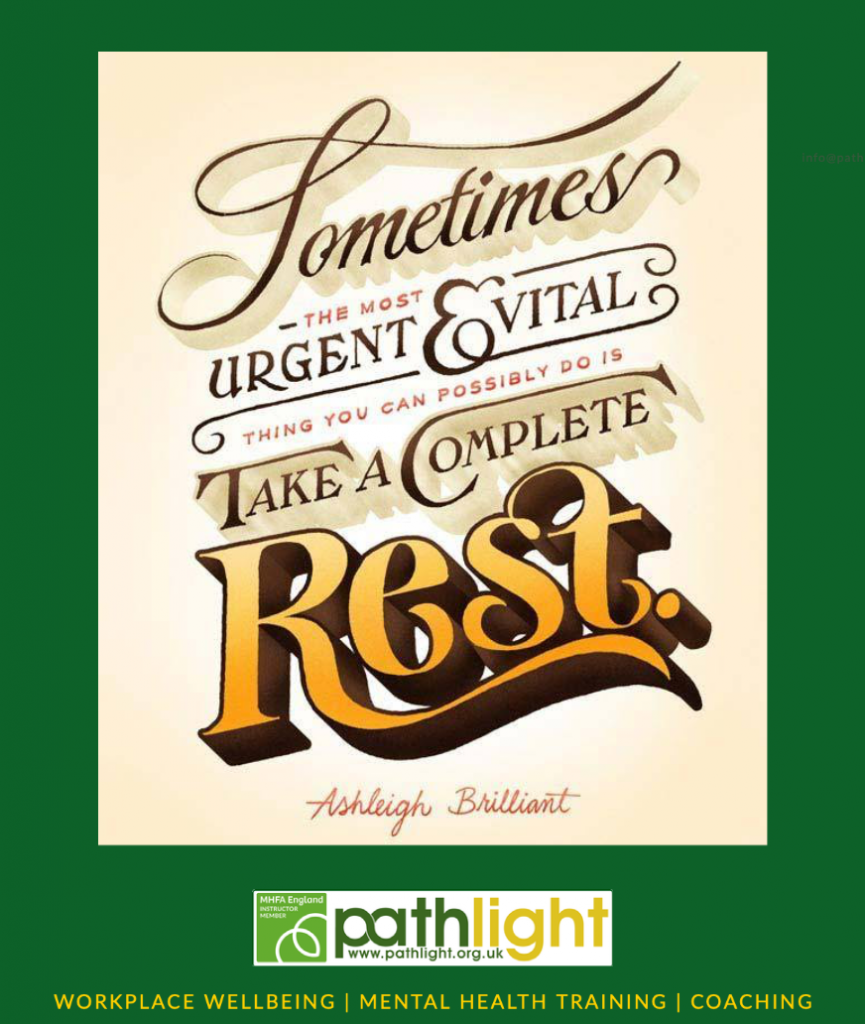
Failing to get enough rest on a regular basis can have a negative impact on our mental health. Working without proper breaks and failing to maintain a healthy work-life balance can result in:
- Chronic stress
- Anxiety disorders
- Depression and other mood disorders
As well as the significant implications for individual wellbeing, organisations suffer from having employees who are not well-rested. Poor mental health often goes hand-in-hand with reduced motivation, engagement and productivity, increased absence from work and higher staff turnover.
Poor mental health costs UK employers up to £45 billion each year. But for every £1 spent by employers on mental health interventions, they get back £5 in reduced absence, presenteeism and staff turnover (Deloitte, 2020). Organisations that invest in initiatives like Mental Health First Aid and holistic workplace wellbeing programmes report huge positive impacts in terms of return on investment and also employee wellbeing.
Be comfortable taking a mental health day
There is much stigma around mental health issues. As a result of this, many people struggle to admit when they are experiencing mental health challenges. One way to break down this stigma is to openly state when you are struggling and share it with your employer.
If you feel the need to take time off work due to stress or a mental health issue, treat it like you would if you were physically ill. Nurture yourself with compassion and do things that make you feel better.

- Focus completely on yourself. Give you brain a rest. Rather than working through your chores or emails, focus on self-care.
- Do things that bring you joy or relaxation. Take a relaxing bath, read a book, watch some comedy, meditate or walk in nature. Do whatever works for you to rebalance, build resilience and reconnect you to yourself.
- If you are depressed, you may lack motivation and struggle to find joy. When you are feeling resilient, make a list of things that make you feel better and create a playlist of uplifting songs. You can then access these nourishing tools with very little effort the next time you are feeling low.
Further support and information…
- Download Pathlight’s FREE holistic resource: Successfully Navigating Homeworking for more tips on working from home.
- Click here to sign up to our e-newsletter for updates on our services, resources to support mental health & wellbeing and more.
- Visit our website or email us for details of our services:
- Mental Health First Aid training
- Workplace wellbeing programmes
- Coaching for individuals, families and teams
- Webinars for individuals and organisations
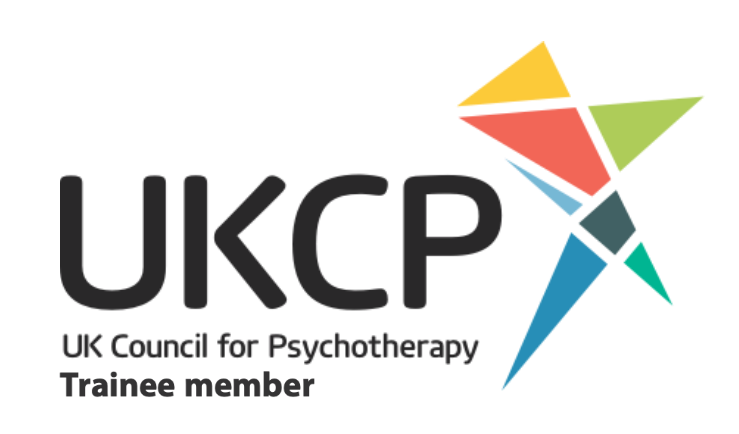



Author: Paul Wolstenholme, Director of Pathlight Ltd, Mental Health First Aid instructor, psychotherapist in training, workplace wellbeing consultant and coach.
For more information on this blog post, interviews or services provided by Pathlight Ltd, please email Paul: info@pathlight.org.uk
